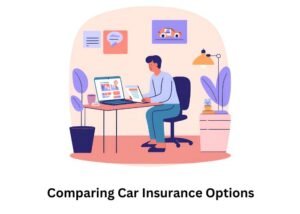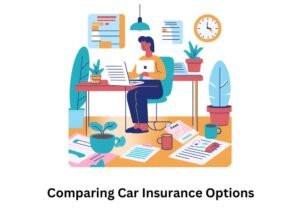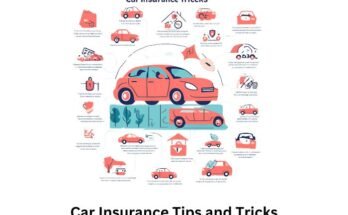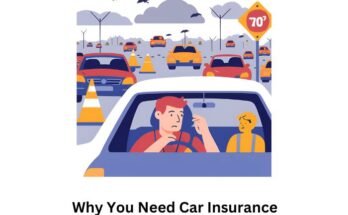Overview of Car Insurance
Navigating the world of car insurance can be complex, but understanding the fundamentals can make the journey smoother. Car insurance is a contract between the driver and the insurance company, designed to provide financial protection in case of accidents, theft, or other vehicle-related incidents. With various options available, it’s essential to know what to look for when comparing car insurance policies.
The basic premise of car insurance involves paying a premium in exchange for coverage. This coverage can range from liability protection, which handles damages and injuries you may cause to others, to more comprehensive plans that cover your own vehicle in the event of theft or natural disasters. Each policy comes with its own set of terms, conditions, and limits, so it’s vital to read through them carefully.
Understanding the different coverage types can also help in making informed decisions. Liability coverage is often mandatory and covers the costs associated with injuries and damages to others if you’re at fault in an accident. On the other hand, collision and comprehensive coverages offer broader protection but come at an additional cost. Collision coverage pays for repairs to your car following an accident, while comprehensive coverage takes care of non-collision-related incidents.
Additional options, like uninsured motorist coverage and personal injury protection (PIP), provide further layers of security. Uninsured motorist coverage is particularly useful if you’re hit by a driver who doesn’t have adequate insurance. PIP helps cover medical expenses for you and your passengers, regardless of who is at fault in the accident.
By understanding these fundamentals, you can better navigate the myriad options and make choices that align with your needs and budget.

Varieties of Car Insurance Coverage
Car insurance policies offer different levels of protection tailored to meet various needs. Liability coverage, often mandated by law, covers damages and injuries you may cause to others in an accident. Collision coverage provides for repairs to your vehicle after a collision, regardless of fault. Comprehensive coverage, which is broader, includes non-collision-related incidents such as theft, vandalism, and natural disasters.
In addition to these core types, there are other coverages worth considering. Uninsured motorist coverage is crucial if you’re involved in an accident with a driver who lacks adequate insurance. It helps cover your expenses in such scenarios. Personal Injury Protection (PIP) offers coverage for medical expenses for you and your passengers, irrespective of fault. This is especially useful in no-fault states where each driver’s insurance covers their own medical costs.
Other specialized coverages can provide further security. For instance, roadside assistance can be a lifesaver in case of a breakdown, offering services like towing and flat tire changes. Gap insurance is another option, particularly valuable for those with new or financed cars; it covers the difference between your car’s depreciated value and what you owe on it if the vehicle is totaled.
Rental reimbursement is another add-on to consider. It helps cover the cost of a rental car while your vehicle is being repaired following an accident. Lastly, rideshare insurance is essential if you drive for companies like Uber or Lyft, as it bridges the gap between personal and commercial coverage.
By exploring these different coverages, you can tailor your car insurance policy to better suit your specific needs and circumstances.
Elements Influencing Car Insurance Costs
Insurance premiums for car coverage can vary widely due to several influencing factors. One significant factor is the driver’s age, with younger individuals often facing higher rates due to a higher perceived risk. Your driving history also holds weight; those with a clean record usually benefit from lower premiums, while a history of accidents or traffic violations can result in higher costs. The type of vehicle you drive is another crucial consideration. High-performance cars often come with steeper premiums due to their increased repair costs and the likelihood of being involved in accidents.
Your geographic location can also impact insurance rates. Urban areas with dense traffic and higher accident rates typically lead to higher premiums compared to rural settings. Additionally, your credit score can play a role in determining your insurance costs. Many insurers view a good credit score as indicative of responsible behavior, which can lead to lower premiums.
Another factor is the frequency and type of use of your vehicle. Cars used for long commutes or business purposes often incur higher premiums than those used infrequently. Safety features in your car can also affect your rates. Vehicles equipped with advanced safety features like anti-lock brakes, airbags, and electronic stability control may qualify for discounts.
Finally, the coverage levels and deductibles you choose can influence your premium. Higher deductibles generally result in lower premiums, but it’s essential to ensure you can cover the out-of-pocket costs if an accident occurs. Customizing your policy to fit your specific needs while considering these various factors can help you manage your car insurance costs effectively.
Assessing Car Insurance Companies
When evaluating car insurance companies, it’s important to look beyond the policies they offer. Start by investigating the financial health of the provider. A company with strong financial ratings is more likely to be reliable when it comes to paying out claims. Sites like A.M. Best, Moody’s, and Standard & Poor’s can provide insights into an insurer’s financial stability.
Customer service quality is another crucial factor. Look for companies that have high ratings in customer satisfaction. Review platforms and consumer reports can offer useful information about how well a company treats its policyholders. Pay special attention to feedback about the ease and efficiency of the claims process, as this can significantly impact your overall experience.
Another aspect to consider is the range of services and coverage options offered. Some insurers provide additional benefits such as accident forgiveness, new car replacement, or vanishing deductibles. These features can add value to your policy and enhance your coverage experience.
Availability of discounts can also be a decisive factor. Many insurers offer various discounts for safe driving, bundling policies, or installing anti-theft devices. These discounts can help you save on premiums and make the overall cost of insurance more manageable.
Accessibility and ease of managing your policy are important too. Companies that offer robust online platforms or mobile apps for policy management, claims filing, and customer support can make the process more convenient for you.
By carefully evaluating these factors, you can make an informed decision and choose an insurance provider that aligns well with your needs and expectations.

Advice for Securing Cost-Effective Car Insurance
Shopping around and comparing quotes from different insurers is a vital step in securing cost-effective car insurance. Prices can vary widely between companies, so taking the time to gather multiple quotes can lead to substantial savings. Additionally, consider the type of coverage you actually need. Avoid over-insuring by selecting only the coverages that are essential for your specific situation.
Bundling your car insurance with other policies, such as home or renters insurance, can often result in discounts. Many insurance companies provide reduced rates for customers who hold multiple policies with them. Similarly, take advantage of any discounts available for your vehicle. Features like anti-theft devices, advanced safety systems, and even good student discounts for young drivers can significantly lower your premium.
Pay attention to your mileage. Some insurers offer lower rates for vehicles that are driven less frequently. If you work from home or use public transportation often, you might qualify for a low-mileage discount.
Improving your credit score can also lead to lower premiums. Insurers often consider your credit score when determining rates, as a higher score is viewed as an indicator of financial responsibility.
Consider paying your premium annually instead of monthly. While it requires a larger upfront payment, many insurers offer a discount for paying in full. This can be a straightforward way to save money over the long term.
Lastly, participating in a defensive driving course can earn you a discount. Many insurers recognize the value of these courses in reducing accident risk and reward policyholders who complete them with lower rates. Taking the time to understand and utilize these strategies can help you secure a more cost-effective car insurance policy.
Commonly Asked Questions
Navigating the complexities of car insurance often leads to several common questions. One frequently asked question is about the right coverage amount. Assessing your financial situation, vehicle value, and risk tolerance is crucial in making this decision. Another typical concern involves policy renewal, which generally occurs automatically. However, reviewing your coverage annually ensures it remains suitable.
Cancellation policies are also a common topic. Most insurers permit policy cancellation at any time, but understanding potential fees and requirements is essential. Additionally, many people inquire about the claims process, specifically the duration and required documentation. Ensuring you have the necessary information and maintaining prompt communication with your insurer can help expedite this process.



